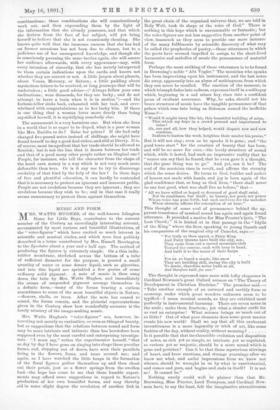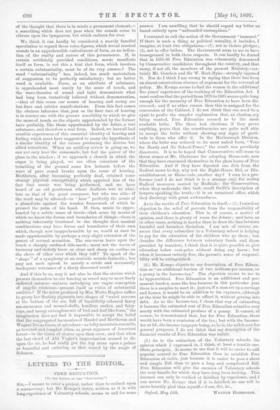MUSIC AND FORM.
MRS. WATTS HUGHES, of the well-known Islington Home for Little Boys, contributes to the current number of the Century an exceedingly interesting account, accompanied by most curious and beautiful illustrations, of the " voice-figures " which have excited so much interest in scientific and musical circles, and which were first publicly described in a letter contributed by Mrs. Russell Barrington to the Spectator about a year and a half ago. The method of producing the figures is extremely simple. On a thin india- rubber membrane, stretched across the bottom of a tube of sufficient diameter for the purpose, is poured a small quantity of water or some denser liquid, such as glycerine, and into this liquid are sprinkled a few grains of some ordinary solid pigment. A note of music is then sung down the tube by Mrs. Watts Hughes, and immediately the atoms of suspended pigment arrange themselves in a definite form,—many of the forms bearing a curious resemblance to some of the most beautiful objects in Nature, —flowers, shells, or trees. After the note has ceased to sound, the forms remain, and the pictorial representations given in the Century show how wonderfully accurate is the lovely mimicry of the image-making music.
Mrs. Watts Hughes's " voice-figures " are, however, in- teresting not merely as curiosities, or even as things of beauty, but as suggestions that the relations between sound and form may be more intricate and intimate than has heretofore been supposed even by the most careful and enterprising investiga- tors. " I must say," writes the experimenter herself, " that as day by day I have gone on singing into shape these peculiar forms, and, stepping out of doors, have seen their parallels living in the flowers, ferns, and trees around me; and again, as I have watched the little heaps in the formation of the floral figures gather themselves up and then shoot out their petals, just as a flower springs from the swollen bud—the hope has come to me that these humble experi- ments may afford some suggestions in regard to Nature's production of her own beautiful forms, and may thereby .aid in some slight degree the revelation of another link in the great chain of the organised universe that, we are told in Holy Writ, took its shape at the voice of God." There is nothing in this hope which is unreasonable or fantastic ; but the voice-figures are not less suggestive from another point of view, inasmuch as they seem to provide one more instance of the many fulfilments by scientific discovery of what may be called the prophecies of poetry,—those utterances in which the poets have seemed impelled to assign to the short-lived harmonies and melodies of music the permanence of material form.
Perhaps the most striking of these utterances is to be found in Browning's noble " Abt Vogler." The musician who speaks has been improvising upon his instrument, and the last notes die away, apparently into an abyss of nothingness, from which they can never be recalled. The emotion of the moment, in which triumph fades into sadness, expresses itself in a soliloquy which, beginning in a sad minor key, rises into a confident paean of exultant assurance. Why, he asks, should not his brave structure of music have the tangible permanence of that palace which rose into being as Solomon named the ineffable Name P-
" Would it might tarry like his, this beautiful building of mine, This which my keys in a crowd pressed and importuned to raise !
Ah, one and all, how they helped, would dispart now and now combine,
Zealous to hasten the work, heighten their master his praise."
But it will not stay ; even as he speaks it is gone ; and " the good tears start " for the creation of beauty that has been, and will be no more for over,—the lovely structure of sound which, while it lasted, had such an impressive reality that he " scarce can say that he feared, that he even gave it a thought, that the gone thing was to go." And yet, can it be ? The soul of the musician rises in revolt, and affirms the eternity which the sense denies. He turns to God, builder and maker of houses not made with hands, and joy is born again of the glad confidence that, so long as God lives, "there shall never be one lost good, what was shall live as before," that-
" All we have willed or hoped or dreamed of good shall exist, Not its semblance, but itself ; no beauty, nor good, nor power Whose voice has gone forth, but each survives for the melodist When eternity affirms the conception of an hour."
This thought of some soul of permanence behind the ap- parent transience of musical sound has again and again found utterance. It provided a motive for Miss Procter's lyric, " The Lost Chord; " it is hinted at in that passage in the " Idylls of the King" where the Seer, speaking to young Gareth and his companions of the magical city of Camelot, says :—
" For truly as thou sayest, a Fairy King And Fairy Queens have built the city, son ; They came from out a sacred mountain-cleft Toward the sunrise, each with harp in hand, And built it to the music of their harps.
For an ye heard a music, like snow They are building still, seeing the city is built To music, therefore never built at all, And ili.erefore built for ever."
The thought is expressed once more with lofty eloquence in Cardinal Newman's great Oxford sermon on " The Theory of Development in Christian Doctrine." The preacher said :— " Take another example of an outward and earthly form or economy, under which great wonders unknown seem to be typified—I mean musical sounds, as they are exhibited most perfectly in instrumental harmony. There are seven notes in the scale ; make them fourteen ; yet what a slender outfit for so vast an enterprise i What science brings so .much out of so little ? Out of what poor elements does some great master create his new world Shall we say that all this exuberant inventiveness is a mere ingenuity or trick of art, like some fashion of the day, without reality, without meaning ? Is it possible that that inexhaustible evolution and disposition of notes, so rich yet so simple, so intricate yet so regulated, so various yet so majestic, should be a mere sound which is gone and perishes P Can it be that those mysterious stirrings of heart, and keen emotions, and strange yearnings after we know not what, and awful impressions from we know not whence, should be wrought in us by what is unsubstantial, and comes and goes, and begins and ends in itself P It is not so i It cannot be."
Nothing surely could well be plainer than that Mr. Browning, Miss Procter, Lord Tennyson, and Cardinal New- man have, to say the least, felt the imaginative attractiveness of the thought that there is in music a permanent element,— a something which does not pass when the sounds cease to vibrate upon the tympanum, but which endures for ever.
We think it can hardly be considered a merely fanciful speculation to regard these voice-figures, which reveal musical sounds in an apprehensible embodiment of form, as an indica- tion of the reality and nature of this permanence. If, in certain artificially provided conditions, music manifests itself as form, is not this a hint that form, which involves a certain substantiality, must be of its very essence P The word " substantiality " has, indeed, too much materialism of suggestion to be perfectly satisfactory ; but no better word is available. Form, as an attribute of substance, is apprehended most surely by the sense of touch, and the wave-theories of sound and light demonstrate what had long been tentatively believed without demonstration, —that of this sense our senses of hearing and seeing are but finer and subtler manifestations. From this fact comes the obvious inference that, just as the finer tact of hearing is in essence one with the grosser sensibility to which we give the name of touch, so the objects apprehended by the former have probably, like those apprehended by the latter, a real substance, and therefore a real form. Indeed, we have all had sensible experiences of this essential identity of hearing and feeling which must have suggested to many the hypothesis of a similar identity of the causes producing the diverse but allied sensations. When an artillery review is going on, we can not only hear the cannonade, but feel the quiver of the glass in the window ; if we approach a church in which the organ is being played, we are often conscious of the trembling of the ground some few instants before the wave of pure sound breaks upon the sense of hearing. Beethoven, after becoming perfectly deaf, retained some strange physical susceptibility which apprised him of the fact that music was being performed, and we have heard of an old gentleman whose deafness was as abso- lute as that of the great composer, but who was able—if the word may be allowed—to " hear " perfectly the music of a pianoforte against the wooden framework of which he pressed the palm of his hand. If, then, music be appre- hended by a subtle sense of touch—that sense by means of which we know the forms and boundaries of things—there is nothing inherently irrational in the thought that musical combinations may have forms and boundaries of their own which, though now inapprehensible by us, would at once be made apprehensible by perhaps a very slight extension of the, gamut of normal sensation. The sea-waves leave upon the beach a sharply outlined tide-mark ; must not the waves of harmony and melody leave as clear and sharp an outline on the shore of ether over which they roll? To speak of the " shape " of a symphony or an oratorio sounds fantastic ; but may not such speech be merely a crude and necessarily inadequate utterance of a dimly discerned truth P And if this be so, may it not also he that the strains which present themselves to our hearing as sound may to more finely endowed natures—natures embodying our vague conception of angelic existence—present itself as vision of substantial realities P If the notes produced by Mrs. Watts Hughes suffice to group her floating pigments into shapes of "weird caverns at the bottom of the sea, full of beautifully coloured fancy sea-anemones and mussel-shells, headless snakes, and fairy- cups, and mossy entanglements of bud and leaf-like form," the imagination does not find it impossible to accept the belief that the congregated harmonies of Handel and Beethoven and Wagner live as forms of splendour—as lofty mountain summits, as towered and templed cities, as great expanses of luxuriant forest—in the vision of clearer eyes than ours; and that when the last chord of Abt Vogler's improvisation seemed to die upon, the air, he had really put the top stone upon a palace as beautiful and enduring as that reared by the magic of Solomon.



































 Previous page
Previous page